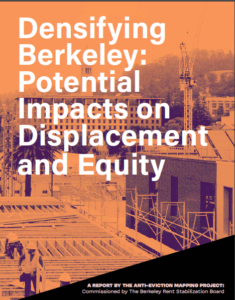Authored by #UnequalCities Network partner the Anti-Eviction Mapping Project
Excerpt: The outcomes of upzoning depend on the particular nuances of upzoning policies as well as the unique contexts in which they are implemented. In this study, we couple a review of the research and debates on upzoning in the state and beyond with a rigorous analysis of the impact of development on Berkeley communities, as well as a model for projecting their risk to future displacement caused by zoning reform. We analyze data from the American Community Survey (ACS), Integrated Public Use Microdata Series (IPUMS), Alameda County Assessor’s Office, and the Berkeley Rent Stabilization Board and City of Berkeley to understand the particular housing needs of Berkeley’s communities and project their vulnerability to displacement. We also examine the impact of past development and zoning changes in three key Berkeley neighborhoods: Downtown Berkeley, the area immediately south of the UC Berkeley campus, and West Berkeley. Our recommendations look at how Berkeley can use zoning reform in combination with its strong tenant protections to distribute the benefits of upzoning more equitably, and to mitigate the risks of displacement and impacts of racial exclusion.
Download >> Densifying Berkeley: Potential Impacts on Displacement and Equity


